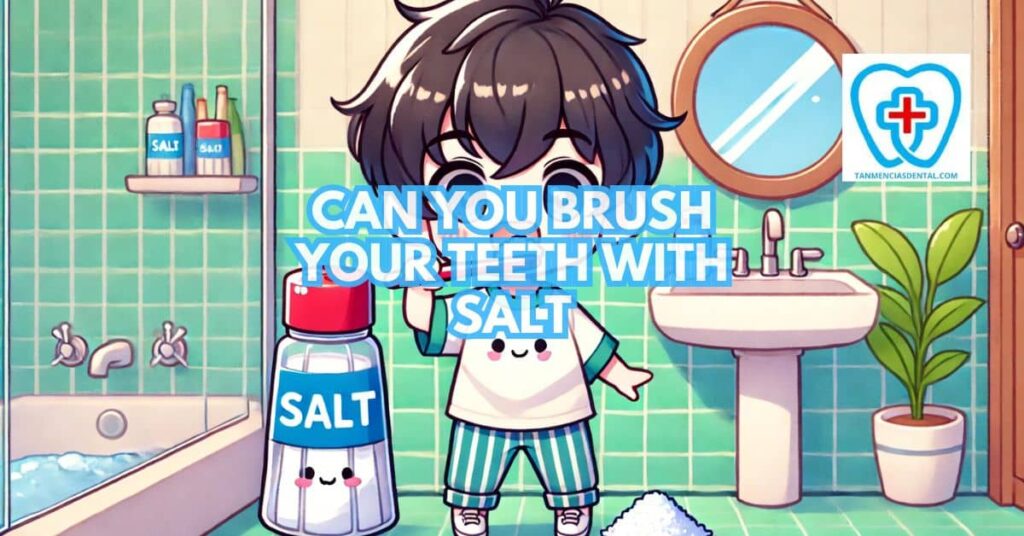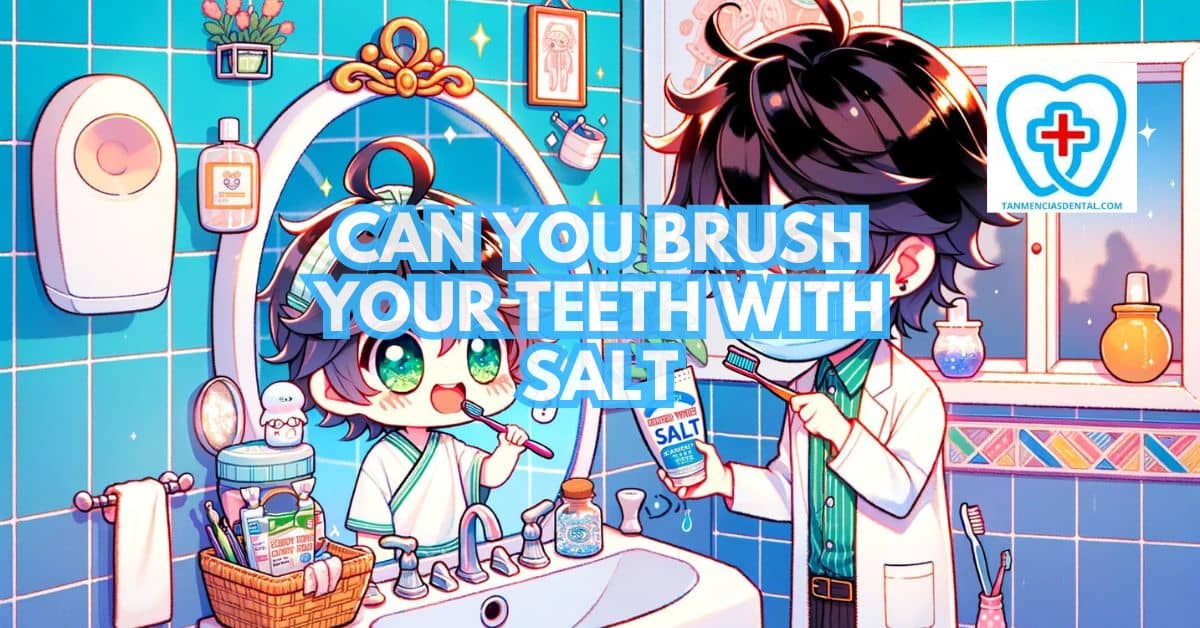Have you ever wondered, can you brush your teeth with salt?
This simple kitchen staple has long been praised for its cleaning and antibacterial properties.
Some people turn to salt as a natural alternative to toothpaste, but is it actually safe and effective?
We’ll dive into the science behind salt’s impact on your teeth and gums.
You’ll know whether this old-fashioned remedy is worth adding to your routine or best left in the past.
1. How Cultures Throughout History Have Used Salt to Clean Teeth
Throughout history, brushing teeth with salt was a common practice in many cultures, valued for its natural cleansing properties.
Ancient Egyptians, for example, would mix salt with other ingredients to create a powder for scrubbing teeth and keeping their mouths fresh.
The Greeks and Romans followed similar routines, believing salt could remove food particles and bacteria from the mouth.
In parts of Asia and the Middle East, sea salt specifically was used for its coarse texture and trace minerals, which were thought to contribute to stronger teeth and gums.
Even today, some people around the world use salt as an alternative to toothpaste, especially in areas where commercial products are scarce or expensive.
Although modern toothpaste has largely replaced salt, learning about these historical methods sheds light on the potential benefits salt was believed to offer for oral health.
This enduring interest in salt-based oral care reflects a desire for simple, natural methods to keep teeth clean and gums healthy.
🦷 How Regular Dental Cleanings Can Prevent Serious Oral Health Problems
2. Can Salt Scrub Away Plaque?
Salt’s gritty nature suggests it could mechanically remove plaque from teeth surfaces.
By rubbing against the teeth, salt particles might scrape off the plaque that contributes to tooth decay and gum disease.
However, salt lacks the refined properties of modern toothpastes designed for plaque removal.
Frequent use of salt for brushing could potentially lead to gum irritation or damage due to its abrasive texture.
Thus, while salt may offer temporary plaque reduction, its effectiveness and safety are inferior to those of standard dental products.
🦷 Are Dentists in Demand? A Look at the Future of Dental Jobs
3. Does Salt Zap Bacteria in the Mouth?
Salt has been recognized for its ability to inhibit bacterial growth, which could be beneficial in oral hygiene.
When used in the mouth, salt can create a hostile environment for bacteria by drawing out moisture, which bacteria need to thrive.
This dehydration effect can reduce the overall bacterial load in the mouth, helping to control bad breath and dental decay.
However, salt does not discriminate between harmful and beneficial oral bacteria, possibly disrupting the balance needed for a healthy mouth.
Moreover, the bactericidal effect of salt is less targeted and less comprehensive than that of antibacterial agents found in commercial mouthwashes and toothpastes.
🦷 Are Dentists Open on Saturdays? Tips for Booking Your Appointments
4. Saltwater Rinse: A Soothing Relief for Mouth Sores
Using a saltwater rinse can provide relief for those suffering from mouth sores, gum inflammation, or dental procedures.
The osmotic effect of salt helps reduce swelling and flush out irritants and bacteria from the mouth.
It’s a gentle, natural method that can soothe tissues without the use of harsh chemicals, making it suitable for frequent use.
Saltwater is particularly useful in managing oral wounds and ulcers by promoting faster healing.
However, while saltwater rinses aid in symptom relief, they do not prevent the underlying causes of oral diseases.
🦷 Can You Brush Your Teeth With Soap? The Truth About This Practice

5. The Fluoride Factor: Why Salt Falls Short
Salt does not contain fluoride, a mineral essential for fighting tooth decay and strengthening tooth enamel.
Fluoride plays a crucial role in the remineralization process of teeth, helping to rebuild weakened enamel and prevent the formation of cavities.
Without fluoride, salt cannot offer the same protective benefits against dental caries that fluoride-infused toothpastes provide.
This absence is particularly significant in areas where dental decay is prevalent and fluoride is needed to combat oral health issues.
Consequently, while salt can clean teeth to some degree, it cannot replace fluoride toothpaste in promoting long-term dental health.
🦷 Are Carbonated Drinks Bad for Your Teeth? The Effects of Soda and Sparkling Water
6. Brushing with Salt: A Recipe for Enamel Erosion
Regular use of salt as toothpaste can lead to the erosion of dental enamel, the hard outer surface of teeth.
The abrasive nature of salt particles can wear down enamel over time, making teeth more vulnerable to decay and sensitivity.
Once enamel is eroded, it does not regenerate, leaving teeth permanently damaged and more susceptible to further deterioration.
This erosion can also lead to increased tooth sensitivity, making eating hot, cold, or sweet foods uncomfortable.
Therefore, the risk of enamel damage makes salt a poor choice for daily dental hygiene.
🦷 Key Steps for Effective Oral Care: Get Your Best Smile
7. Safer Alternatives: Natural Teeth Cleaning Options
For those seeking natural alternatives to traditional toothpaste, several safer options exist that are less abrasive than salt.
Baking soda, for instance, has a lower abrasivity and is still effective in removing plaque without damaging enamel.
Herbal toothpastes and those made with essential oils offer additional natural benefits, such as anti-inflammatory properties and pleasant flavors, without harsh effects.
Some products also incorporate mild abrasives like calcium carbonate or silica, which clean effectively yet gently.
These alternatives provide a balance between natural ingredients and oral health efficacy, making them suitable for daily use.
🦷 Can Braces Cause Your Teeth to Fall Out? Debunking Common Myths
8. Salt Toothpaste: A Blend of Good and Not-So-Good
Some manufacturers have attempted to harness the benefits of salt in formulated toothpastes by blending it with other ingredients.
These toothpastes often include salt as a minor abrasive and antibacterial agent, combined with other components that mitigate its harsh effects.
While this blend can offer a compromise, providing some of the cleansing properties of salt, it often lacks sufficient fluoride unless specifically added.
Consumers should be cautious and read labels to understand what they are getting from such products.
While salt toothpaste can be part of an oral hygiene routine, it should not be relied upon as the sole dental care product.
🦷 How to Brush Your Teeth Without Water: Tips for Freshness Anytime
9. Regular Dental Checkups: The Key to a Healthy Smile
Regular dental checkups are essential for maintaining overall oral health and catching potential issues early.
During these visits, dentists perform thorough cleanings that remove plaque and tartar buildup unreachable by daily brushing alone.
These checkups also provide an opportunity for dentists to assess the health of your gums, teeth, and mouth, ensuring any signs of decay or disease are addressed promptly.
Dentists can also provide guidance on the best oral hygiene practices and products tailored to individual needs.
Neglecting regular checkups can lead to serious dental issues, underscoring the importance of keeping these appointments.
🦷 Find the Best Mouthwash for Tartar: Solutions for Your Dental Routine
10. Consult Your Dentist: Personalized Advice for Your Oral Health
Before making changes to your dental care routine, such as incorporating salt as a cleaning agent, it is vital to consult with a dentist.
Each person’s oral health is unique, with different sensitivities and conditions that may affect the suitability of certain products.
A dentist can offer advice based on a thorough understanding of your dental history and current health.
This personalized guidance helps ensure that your oral care practices effectively support your dental health without causing harm.
Consulting a professional helps avoid the pitfalls of adopting unsuitable or harmful dental practices based on general advice.
🦷 Keep Your Teeth Healthy with Teeth Cleaning in Marikina
11. Young Smiles Need Gentle Care: Avoid Salt for Children
The use of salt for brushing children’s teeth is not recommended due to their sensitive and developing oral tissues.
Children’s enamel is softer and more vulnerable to abrasion than that of adults.
Using salt can quickly cause wear and tear on these young teeth, leading to damage and discomfort.
Additionally, the taste of salt can be unpleasant for children, possibly deterring them from brushing regularly.
Pediatric dentists generally recommend using specially formulated children’s toothpaste that contains appropriate fluoride levels and is gentle on the teeth and gums.
🦷 Tan-Mencias Dental Clinic Marikina
👨⚕️ Conclusion
While traditional practices such as using salt for oral hygiene date back centuries, modern dental science provides more effective and safer alternatives for maintaining oral health.
It’s crucial to balance the allure of natural remedies with the benefits of scientifically validated dental care products.
Adopting a cautious approach to new or traditional methods, especially without proper consultation, can lead to dental problems rather than solutions.
For the best oral health outcomes, embrace the advancements in dental care while respecting the wisdom of traditional practices where appropriate.
Always consult a dental professional before making significant changes to your oral health regimen.
😊 Self-Promotion
Discover a brighter, healthier smile at Tan-Mencias Dental Clinic, conveniently located in Parang, Marikina City!
Our friendly team is dedicated to providing you with the best dental care in a comfortable and welcoming environment.
Whether you have questions or need to schedule an appointment, you can easily reach us by calling 9171451074, sending a message through our Facebook page, or using the contact form on our website.
We’re here to help you achieve and maintain a healthy smile with the latest in dental technology and treatments.
Visit us at Tan-Mencias Dental Clinic, where your smile is our top priority!

